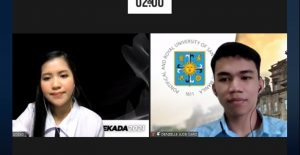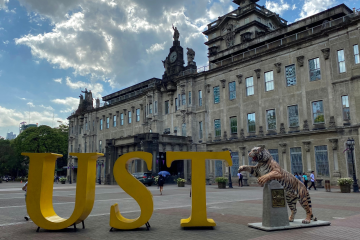by ARTHUR N. APOSTOL

TWO UNOPPOSED candidates’ grasp of political and social issues were tested as they engaged in a fierce Miting de Avance for the 2021 Artlets Student Council (ABSC) special polls last Tuesday.
Candidate for president and political science sophomore Denzelle Jude Caro’s stance on student activism in AB was questioned by students who pointed out how the ABSC was formed during the Marcos dictatorship.
He said he was against activism in AB and that there are other platforms to express it.
“Every channel is blocked because of the pandemic. In your student activism, currently, you are individualistic rather than collective. Right now, there are differences and vulnerabilities that we have to consider,” Caro said.
He argued that it is necessary to protect the students’ lives and that student activism is not safe without the protection of the university.
“I am okay with student activism if you are protected and if you are secured but a student activism that harms individuals and harms students and the people that I am willing to represent is counterintuitive,” Caro added.
A product of student activism
Some students reacted to Caro’s statements by sharing a two-year old ABSC post that narrated how the council was formed out of student activism during the time of the late president Ferdinand Marcos.
During the dictatorship, student organizations were banned to discourage youth revolt and activism.
“On June 1980, Ronald Llamas, Eduardo Buenaflor, and Reynaldo Lopez heeded the widespread clamor to establish a student council that will be at the forefront and the voice of youth empowerment in fighting for peace, justice, and democracy,” it read.
Caro admitted that he was not aware of the council’s history before the miting de avance.
Other student body members also took to social media to recall how the council was formed.
“Activism is deeply rooted within our history—from the struggles against our colonizers, to overthrowing fascist, corrupt regimes in the government, and even in the history of the ABSC,” said UST Central Student Council former president Robert Dominic Gonzales.
Gonzales added that the criticisms against Caro are welcome, but should educate rather than “cancel.”
In a tweet, Anakbayan-UST said the “militant spirit” of the Artlets during Martial Law gave birth to ABSC.
“During the time when the government prohibited student organizations, Thomasians from the Faculty of Arts and Letters collectively pushed for the revival of student councils. And in doing so, ABSC was the first student council to be reestablished after Martial Law,” it said.
Auditing and cross-dressing
Meanwhile, some students questioned candidate for auditor and legal management junior Frances Leisa Buensuceso’s knowledge about her desired post after she vowed to audit the Board of Majors (BoM) and its societies.
“Our purpose is to work hand-in-hand with all the societies, internal organizations, Board of Majors inside the university for the benefit of the Artlet community,” Buensuceso said.
Student leaders should not limit themselves to their constitutional duties, and when they make platforms, they must think of ways to provide the immediate needs of their constituents, she added.
After the miting de avance, the UST AB BoM released a statement to clarify its identity, roles, and responsibilities.
“As stated in Article VII, Sections 1 and 4 of the Artlets Student Council constitution, we are identified to mainly function as the legislative arm, composed of the respective presidents of the 13 academic societies of the Faculty of Arts and Letters, serving as the check and balance of the Artlets Student Council,” the board said.
BoM also emphasized that it “does not receive nor use any official funding from the university for activities and events.”
“Moreover, society presidents are not permitted to utilize their society’s funds for external purposes, and with these being said, nothing needs to be liquidated nor audited from BoM,” it added.
Buensuceso also expressed disapproval for a policy that would allow transgender students to cross-dress.
“It is not discouraging them, it is not about not promoting empowerment, rather, it’s just that we have to abide by the rules that we have signed,” she said.
Buensuceso later on apologized for her stance because it was “offensive.”
Proposed policies
Caro said he wants to revise the grievance policy of the ABSC, citing “misinformation” and the inability of students to voice their concerns during the pandemic.
“The Green Tape Grievance Policy aims to secure effective bureaucracy, dissemination of information to students, and committee guidelines and responsibility that will help build up student confidence during the online setup,” Caro told The Flame.
Caro believes the current grievance system is not faulty but lacking.
He also vowed to address the lack of student interaction through his platform “Compassion and Competence,” which aims to organize online events and competitions.
Caro, a former treasurer of the Thomasian Debaters Council, said he decided to run for president because leaving the post vacant would reduce Artlet representation.
Buensuceso said she would represent the Artlet community during online learning by “highlighting the role of liberal arts in dealing with the modern-day challenges.”
“Despite physical restrictions, we will continue to encourage students to be engaged and involved not only within the Artlet community but also with outside organizations,” Buensuceso told The Flame.
“I will be one with the rest of the Executive Board, as well as of the AB admin that formulates policies or projects to support the interest of the students in these trying times,” she added.
Buensuceso, who served as the executive associate to the vice president-internal of the ABSC for two years, also promised to observe transparency and to handle funds properly.
The event was hosted via Facebook live by the Faculty of Arts and Letters (AB) Commission on Elections.
The AB Special Elections will be held online from Sept. 13 to 18.
A candidate must obtain majority votes, or more than half of the votes cast, to be proclaimed the winner. F



